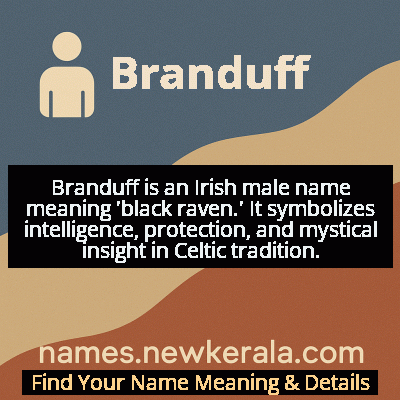Branduff Name Meaning & Details
Origin, Popularity, Numerology Analysis & Name Meaning of Branduff
Discover the origin, meaning, and cultural significance of the name BRANDUFF. Delve into its historical roots and explore the lasting impact it has had on communities and traditions.
Name
Branduff
Gender
Male
Origin
Irish
Lucky Number
9
Meaning of the Name - Branduff
Branduff is an Irish male name meaning 'black raven.' It symbolizes intelligence, protection, and mystical insight in Celtic tradition.
Branduff - Complete Numerology Analysis
Your Numerology Number
Based on Pythagorean Numerology System
Ruling Planet
Mars
Positive Nature
Generous, passionate, energetic, and humanitarian.
Negative Traits
Impulsive, impatient, moody, and can be overly emotional.
Lucky Colours
Red, maroon, scarlet.
Lucky Days
Tuesday.
Lucky Stones
Red coral, garnet.
Harmony Numbers
1, 2, 3, 6.
Best Suited Professions
Military, sports, philanthropy, leadership roles.
What People Like About You
Courage, energy, leadership, generosity.
Famous People Named Branduff
Branduff mac Echach
Ancient Irish Chieftain
Legendary ruler of the Uí Liatháin kingdom in Munster
Branduff O'Donovan
Scholar and Historian
Preserved important Gaelic manuscripts
Branduff McCarthy
Poet and Writer
Authored collections blending traditional and modernist Irish poetry
Name Variations & International Equivalents
Click on blue names to explore their detailed meanings. Gray names with will be available soon.
Cultural & Historical Significance
Throughout the medieval period, the name appeared in various annals and genealogies, particularly among noble families in Munster and Leinster, where it symbolized both martial prowess and royal authority. The raven's association with the Morrigan, the triple goddess of war, fate, and death, added layers of mystical significance to the name. In modern times, Branduff represents a connection to Ireland's ancient past and serves as a symbol of cultural preservation, appealing to those who wish to maintain links to Gaelic traditions and mythology in an increasingly globalized world.
Extended Personality Analysis
Individuals named Branduff are often perceived as possessing the keen intelligence and strategic thinking associated with their raven namesake. They tend to be observant, analytical, and capable of seeing patterns and opportunities that others might miss. Like the raven in Celtic tradition, they often demonstrate adaptability and resourcefulness in challenging situations. There's typically a strong sense of loyalty to family and community, combined with a protective instinct that mirrors the raven's role as a guardian in mythology.
Many Branduffs exhibit natural leadership qualities, though they may prefer to lead through wisdom and insight rather than overt authority. They often have a deep connection to tradition while simultaneously embracing innovation, creating a unique balance between respect for the past and vision for the future. Their communication style tends to be direct yet thoughtful, and they frequently demonstrate the raven's legendary problem-solving abilities in both personal and professional contexts. The name suggests someone who is comfortable with complexity, capable of navigating difficult situations with grace, and possesses an innate understanding of both practical matters and deeper philosophical questions.
Modern Usage & Popularity
In contemporary times, Branduff remains a rare but cherished name, primarily used within Irish communities and by those with strong connections to Celtic heritage. While it has never ranked among popular baby names in Ireland or other English-speaking countries, it has seen a modest resurgence in recent decades as part of the broader Celtic revival movement. The name is most commonly found in Ireland, particularly in counties with strong Gaelic traditions, and among Irish diaspora communities in the United States, Canada, and Australia. Modern parents who choose this name often value its deep cultural roots, unique sound, and powerful symbolism. It appeals to those seeking a distinctive name that honors Irish heritage without being overly common. The name's rarity makes it stand out while maintaining authentic cultural significance, and it's often chosen by parents with interests in mythology, history, or environmental conservation.
Symbolic & Spiritual Meanings
The name Branduff carries rich symbolic meanings rooted in Celtic cosmology and natural symbolism. The black raven represents transformation, mystery, and the ability to navigate between different realms of existence. In Celtic tradition, ravens were associated with the Morrigan, the goddess of war and sovereignty, making the name symbolic of protection, strategic wisdom, and royal authority. The raven's black coloration symbolizes the unknown, intuition, and the hidden knowledge that can only be accessed through deep observation and experience. As a creature that thrives in challenging environments, the raven also symbolizes resilience, adaptability, and the ability to find opportunity in adversity. The combination of these qualities makes Branduff a name that embodies intelligence, protection, mystical insight, and the courage to face life's challenges with wisdom and grace, while maintaining a connection to ancient Celtic spiritual traditions and natural wisdom.

